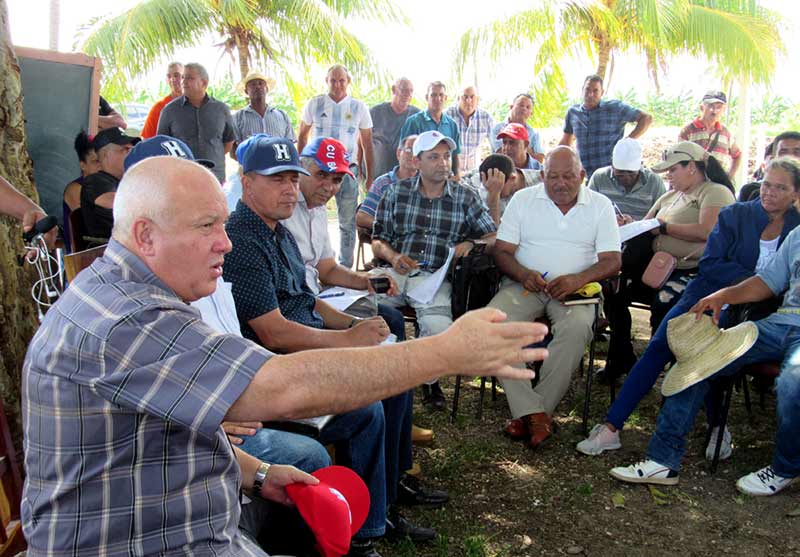Cuban vice PM checks agricultural program in Mayarí
- Written by Maribel Flamand Sánchez
- Published in Holguin
- Hits: 753

The Deputy Prime Minister Jorge Luis Tapia Fonseca met with peasants and members of productive forms associated with the Guatemala Agricultural Company to analyze fundamental issues of the agri-food program, such as the implementation of the 63 measures applied to this sector and the problems affecting its development.
In the meeting held in Valle Dos of the communityof Chavaleta in the Holguín municipality of Mayarí, Tapia was interested in the real problems that prevent producing more food for the population, a core issue in Cuban daily life, where the producer is the most important link in the work of institutions and entities that support production.
Among the deficiencies, it stood out the poor application of the irrigation systems in an area privileged by the East-West Transfer, an important hydraulic investment that supplies the productive pole of Mayarí, considered one of the largest in the country.
Lorenzo Herrera, one of the most experienced cattle farmers in this area, said that despite efforts to improve irrigation systems, there are still breakage problems that can often be solved quickly, and this is not the case.
Agriculture depends on making accurate decisions and not on obstacles that hinder this activity; permanent attention is needed on these essential tasks in production, he stressed.
The deputy prime minister identified the inefficient attention to producers as another of the weaknesses affecting the development of crops. In this sense, he stressed the need to visit them regularly to learn about the deficiencies and problems they face in their daily work in the field.
He also emphasized the non-payments that affect the sector and the workforce, and reflected on marketing, since there is currently no market management to support the productions of farmers and cooperative members.
Participants also referred to the slaughter of large cattle for human consumption and the distribution of milk to the Dairy Company and how it would achieve fair contracts in a timely manner with the cattle farmers.
The need to close ranks against looting on plantations, non-compliance with milk transportation schedules, non-payments, both in national currency and in freely convertible currency, and the marketing prices of inputs were other issues discussed at the meeting.
Tapia Fonseca ratified the producer as a fundamental link in agriculture, "and as such he must be attended to," he said. He referred to work methods, such as the poor relationship with the man, not from the office but in the ground to clarify his doubts, train them; he recommended the use of agrarian extensionism, elemental for the increase of work productivity from the application of techniques and knowledge developed through scientific research.
At the same time, he pointed out the credit advantages offered by the banking system in the country, an issue that many times the peasant is unaware of, as is the case of the Agricultural Development Bank, one of the most transcendental actions designed in the country to encourage food production.
The construction of housing for the producer, whose plan in the territory is far below the demands, was another important issue addressed in the face of the unfortunate migration of men from the countryside to the city, even though this program is not restricted to a plan, as explained by the Minister of Agriculture.
It is an urgent and priority task to focus on agriculture, where family self-consumption is vital. It is time to produce with our own resources, achieving production chains that boost the local and national economy, Tapia Fonseca highlighted.
